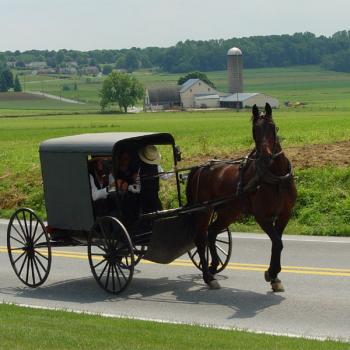Jesus had done all he believed God had asked him to do. He had given up his friends. He had become a vagabond. He had preached and healed, been run out of town. He had forsaken his own mother and brothers in public. He had been called insane, by the woman that bore him, the family that reared him. He had given up everything, and was on the verge of giving up in the garden.
And Jesus, heavy with despair, finally asks God for relief—that the cup of suffering, the cross, might pass. It is a lonely prayer, perhaps the most fervent recorded in the gospels. It is the only prayer in the gospels in which Jesus asks for something only for himself. With prayer, he has raised the dead, driven out demons, healed the sick, lame, and mute, multiplied food and wine, all for others, and all answered with efficacy and immediacy by God. But in the garden, Jesus prays solely on his own behalf, begging God for a different path than the one that leads to the cross. And it just so happens it is Jesus' only prayer that God ignores. There, with sweat like blood falling from his head, the only answer he receives is silence.
And a betrayer's kiss.
My God, my God, why have you forsaken me?
Jesus experiences the human crisis of meaninglessness at the cross, the unraveling of his life and of his life's work. This meaninglessness echoes in our world every death at the iron-fisted hands of institutional violence, all the deaths at the unrelenting hands of hunger and preventable disease. In the war-torn bodies that water the earth with their blood, we see the tragic futility of the cross.
My God, my God, why have you forsaken us?
Today, we mourn with Jesus. We sit in the darkness. Pray into empty silence. Stare into the abyss and dare it to consume us. This is the sobering, daring call of Good Friday, to extinguish the light from our lives, as in the liturgical Tenebrae service. Good Friday challenges us to allow ourselves to experience the forsakenness of Jesus, of humanity, of our lives, that we try our damnedest to ignore every other day of the year. It is one of the few moments in the Christian year that we can admit those feelings in the sanctuary, that the sanctuary welcomes the darkness, the rupture of the death of God. It is the one day that the church opens its doors to those foolish bridesmaids whose lamps went out, who scattered in darkness just like the disciples did at the death of their master. It is the one day when we can scream:
My God, my God, why have you forsaken us?
Every other day of the year, I might pretend to be like the wise bridesmaids, with my lamp trimmed, burning brightly with a reservoir of oil to keep the night at bay while I wait for the bridegroom to finally show up, fashionably, brutally late.But today, I can admit that I have heard but silence in response and that my candle burns only dimly, smoldering, suffocated by doubt, pain, life. Today, I can admit my own God-forsakenness.
O God, our lives too often seem like a collection of Good Fridays mercilessly strung together with overflowing cups of suffering. There always seems to be more confusion than coherency and more of a faith that seems ripped in two. The dead, tortured savior, the nihilism of a forsaken crucifixion, a scramble for meaning, a scattering of God. Let us not turn our heads away from the cross for fear that we will see ourselves there as well.
Holy Saturday: Holding Tragedy In Your Arms
The day that Jesus lay in the tomb isn't a good day for the disciples. Stricken, crushed, defeated, they shrink into the shadows, despairing. At the Last Supper, Jesus informs his disciples that they will all fail him, that they will all fall away, lose heart and collapse under the weight of sorrow. By the time Jesus' lifeless body is taken down from the spectacle of the cross, Peter has betrayed Jesus in public three times, and went away to weep in remorse. Judas has betrayed Jesus to the authorities, and repented, before hanging himself. Two more are making plans to flee by way of the town of Emmaus.
These disciples, the closest friends of Jesus who had left everything and followed him to the end, cannot handle the rupture of the crucifixion and the quiet trauma of a burial. Instead, on Holy Saturday, the unknown disciples emerge, Nicodemus and Joseph of Arimathea. These men had followed Jesus from the shadows, as outsiders, afraid of being discovered by friends, families, colleagues, the rich and the powerful. Holy Saturday belongs to them because they, not the twelve, have the courage to face the death of Jesus. So comfortable with following him in the dark that instead of fleeing like the twelve, they come out of hiding at this most dangerous moment. They tell their secret—that they, too, are followers of Christ—when all hope has evaporated, when they have nothing to gain and everything to lose.




